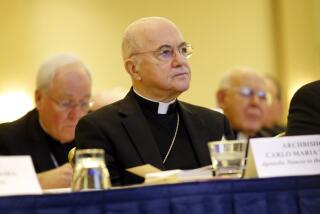An ecclesiastical meltdown
THE CHRISTIAN faith has proved its enduring power over the human imagination. Why, then, are some of the worldâs most prominent Christian leaders, including the pope and the archbishop of Canterbury, working themselves into a lather not only over the pending release of a movie based on a work of pulp fiction but also over the restoration of a 3rd century copy of a dissident 2nd century gospel?
For those who have been locked away in an underground vault, the movie is âThe Da Vinci Code,â adapted from the bestselling Dan Brown novel. The plot revolves around the premise that Mary Magdalene was pregnant with Jesusâ baby at the time of the Crucifixion, that Jesus did not die on the cross and that evil forces within the Roman Catholic Church have killed to protect these secrets for centuries.
An altogether more serious matter in the history of Western religion is the ancient gospel, inscribed on papyrus, which was restored by the National Geographic Society and put on display in Washington last month. Called the Gospel of Judas, it belongs to the Gnostic tradition -- a vibrant strain in early Christianity that emphasized direct personal revelation and was eventually suppressed by the Catholic Church. The restored gospelâs story presents Judas not as the arch-villain of all time but as a willing instrument of Jesus in the service of Godâs plan for salvation.
If I were the pope, my response to âThe Da Vinci Codeâ would have been regal silence -- or at most, a release from the Vatican press office along the lines of âwe are not amused.â As for the Gospel of Judas, I would have issued a bland analysis proclaiming that the early church was right to have rejected Gnosticism as heresy. And then I would have offered a prayer of thanks, as thousands of editors throughout the world deleted my press release from their e-mail, saying âno news here.â
Instead, the Vatican went ballistic during Holy Week, the most sacred period on the Christian calendar. And the archbishop of Canterbury -- whose Church of England has often been at odds with the Vatican since Henry VIII broke from Rome to marry Anne Boleyn -- sounded more Catholic than the pope by denouncing the public âobsessionâ with conspiracy theories. On Holy Thursday, Pope Benedict XVI described Judas as nothing more than a greed-driven âliar and a double-crosser who breaks with the truth.â Only last week, the Vatican called on Catholics to boycott the film as blasphemous.
Such outbursts contrast strongly with the churchâs non-condemnation of Mel Gibsonâs 2004 movie, âThe Passion of the Christ,â which outraged many Jews and liberal Christians with its near-pornographic violence and emphasis on scriptural passages blaming Jews for the death of Jesus. Blasphemy, as always, is defined by whose sensibilities have been offended.
In London on Easter Sunday, Archbishop of Canterbury Rowan Williams declared that the public is so âfascinated by the suggestion of conspiracies and coverups ... that the modern response to the proclamation, âChrist is risen,â would probably be, âAh, but you would say that, wouldnât you. Whatâs the real agenda?â â Although the Anglican archbishop was more moderate in his tone than the pope, he unintentionally may have honed in on the real explanation -- the real agenda, if you will -- for the ecclesiastical meltdown. The problem for church leaders is that both stories -- Brownâs ridiculous cryptological yarn and the ancient statement of faith in the Gospel of Judas -- run counter to the dominant story told for the last 1,700 years by Christian churches.
That Jesus was not a divine being but a great human prophet is a view already held by millions of non-Christians around the world. Indeed, Jesusâ divinity was not taken for granted in the early Christian era and was first proclaimed at the Council of Nicea in 325 AD.
The Gospel of Judas, apart from requiring a rethinking of the betrayer, raises another question for Christians: If Jesus was an all-knowing divine being, how could he not have been aware of Judasâ intentions?
Many scholars have pointed out that the Gospel of Judas, written in the 2nd century, cannot possibly reveal anything of value about the real events surrounding Jesusâ death, generally dated around AD 30. True. But the same can be said of the canonically accepted Gospels of Matthew, Mark, Luke and John, all thought to have been written between AD 70 and AD 100. The biblical gospels are not documents of fact but of faith -- as are the later Gnostic writings.
As a nonbeliever, I am nevertheless certain that neither a new movie nor an old gospel will shake the faith of believing Christians in the biblical account of Jesusâ life and death. The real story of the disproportionate official Christian outrage is that religious leaders do not like it when anyone -- whether a Hollywood filmmaker or an anonymous voice from Christianityâs own past -- challenges their particular narrative of salvation, and by doing so raises the uncomfortable question of whether any religious narrative can reasonably be classified as nonfiction.


